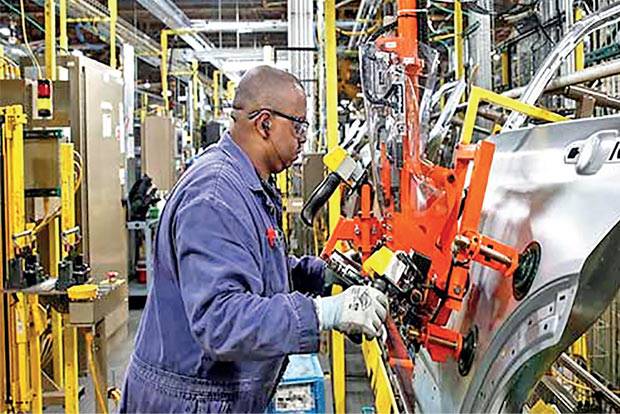Begin typing your search...
Cornered by corona, employers look for strategies to stay afloat
CEOs of India Inc are exploring various options to keep businesses running without resorting to harsh steps like pay and job cuts

Chennai
Working from home may have become the new normal for many businesses, but that is not an option for manufacturing industries and other labour-intensive sectors.
Recently, a group of 50 CFOs across the country, including five from the State, were hooked on to a webinar to discuss the ongoing crisis. These included senior executives from Eicher Group, TVS, Murugappa, Sun Pharma and Bosch. During the 1.5-hour virtual meet, they drew a picture of the economy, before delving into their lockdown plans. In most cases, though salaries for March have been paid, the uncertainty looming ahead is prompting everyone to re-draw their plans.
“Normally, we pass on increments by the end of April. But it will not be there this time. We have taken this decision as our planned expenditure is based on our revenue, and our cash flow has been hit hard due to the pandemic,” said the CFO of a manufacturing company whose monthly wage bill is close to Rs 5 crore. Speaking to DT Next on condition of anonymity, the official said the company had chosen against any compensation cuts. But companies like Bosch, it is learnt, have implemented the promotions.
Other concerns such as the implementation of ‘force majeure’ clause, handling contract workers, re-purposing canteen facilities, pruning costs and conserving cash, and selective vendor payments, too, were discussed during the session. “With most of the factories under lockdown, people working from home even after April 14 is a possibility. Interestingly, productivity in web meetings are better than the physical ones, as it entails finishing on time,” said a source.
The government expects contract labour wages to be protected by invoking the Disaster Management Act. But under the force majeure clause, there is no liability to pay. But the companies have decided to compensate these workers on a temporary basis.
Five factories of Ashok Leyland including at Hosur, Ennore, Pant Nagar and Sriperumbudur, and Eicher have used their canteens to provide food for migrant workers, while others like Ford and TVS Motor have started manufacturing face shields and masks, respectively. Some car makers are also making ventilators.
On vendor payments, some of the attendees said all small vendors would be accorded priority, as most of the customers continue to be serviced. Deferring capital expenditure and a focused effort to not spending on non-essential items to conserve cash are also considered, as they believe that the economy would take minimum of 6 to 12 months to recover at least partially.
“Insurance would have covered business interruption but the COVID-19 does not come under this purview,” noted the CFO, one among the participants who are anticipating the liquidity crunch to persist for the next six months.
While the demand is expected to decline, thereby affecting the growth rate for most of the industries, some expect a surge in two-wheeler sales. “Considering the stress on social distancing, two-wheeler demand may go up as people would avoid public transport,” the person added.
The export business, too, has taken a beating, with companies dealing in leather, textiles and granite bearing the brunt of the pandemic. Rafeeque Ahmed, Chairman, Farida Group, told DT Next that while companies were willing to pay, their ability to do so had to be taken into account. Export to countries like France, Spain, Germany and Italy constituted 70 per cent of its market, he said, adding shipping order cancellations were proving to be a major issue.
Citing the example of Bangladesh, which has come out with a package to support the industry, Ahmed said, “We have made a similar representation to the Prime Minister and the Finance Ministry on Monday to save the exporters. We sought three months’ advance to pay salaries to our workers and allow us to repay the interest over a staggered period of 18 months.”
In the coming three to six months, business could shrink to the extent of 30 to 40 per cent, he added.
Apparel sector, too, would face a similar scenario, as 40 to 50 per cent of the customers are common to leather and textiles.
“Right now, everything is still in an assessment stage. Even opening an email is scary, as the prospect of order cancellation looms ahead,” the industry veteran said, hoping this was only a knee-jerk reaction.
A member from Chemical and Allied Products from India (CAPEXIL) said for 2018-19, it had done USD 22 billion, already down by three per cent over previous period but a downward trend was expected for 2019-20. The association is planning to seek a three-month moratorium and non-payment of GST or income tax, as that money could be channeled to pay salaries.
“Exporters have done deals with Europe and the US, where a 60 to 90 days’ credit period is available. But with COVID19, it may take more than six months before the collections are realised,” this member said, citing the case of a cancelled granite export order worth Rs 4 crore.
Another granite exporter said the firms employing about 300 workers were contemplating 50 per cent pay cut while some of them would pay 75 per cent on humanitarian grounds. “Bringing back labour will be an issue,” said the exporter, who has scaled down his operations to 15 containers a month from 80 containers.
Visit news.dtnext.in to explore our interactive epaper!
Download the DT Next app for more exciting features!
Click here for iOS
Click here for Android
Next Story



